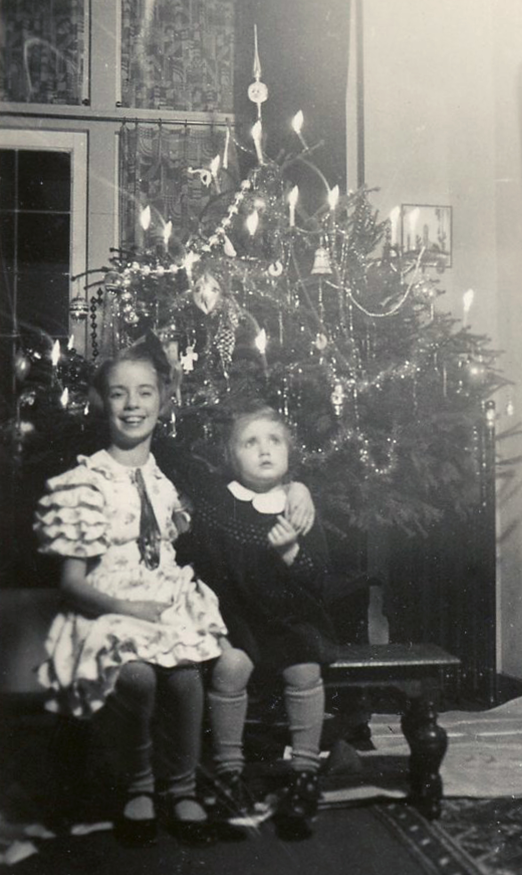
|
|
1939: Gathering clouds 1What he really wanted to be was either a first mate on a freighter or a forest ranger. But his sense of duty got in the way. 3 Let me start over. I am an old fogey and often can't continue after my first try. 4 Adriaan Märckelbach was the youngest of five children. His father died when he was seven years old and his mother, Sijbrigje, a hardy Frisian of few words, wrote a terse obituary; translation: It was a printing business that did contract work and published a horticultural magazine as well as a regional newspaper, De Bussumsche Courant. 6 Sijbrigje's oldest son was 24, some others in their late teens. The oldest was of great help during a time that she looked after her sick husband, her children, and the business. Fortunately, she had some relevant experience from working in her father's bookshop and publishing firm. It wasn't until after attending high school that Adriaan was available to assist her full time. He did so diligently, more so than his brothers, and letting go of his own dreams for the future. 7 Sijbrigje was a prudent financier as was Adriaan, unlike his brothers who he managed to buy out over time. He silently detested reporters for padding their expense accounts and endured a printers' strike that affected a number of newspapers. A socialist he was not. 8 Adriaan died in 1965 at age 69. Frail constitution. Cancer, probably brought on by many years of exposure to vapors from molten type metal—lead, tin, antimony. He had sold his business in 1956, I believe, and his final years—quiet, with his wife, some travel—were among the best in his life. He had been offered a sum for his business that he considered considerably more than he thought it was worth. And so, he lowered it. 9 It is hard to imagine a greater contrast between Adriaan and the girl he married. He a man who very much held to himself, she a vivacious daughter of the owner of a liquor store. He a diligent worker with Spartan needs, she a lover of parties and pastries as did her family. Nevertheless, they got along just fine. 10 Young Elisabeth loved him. The only child for seven years, she was the family's center of affection. He also insisted on good manners, notably table manners. Eating with knife and fork. No talking with a mouth full. Nice family vacations, on the Dutch beaches and in Austria. 11 Travelling through Germany on their last Austrian vacation before World-War II, they noticed heavy military troup transports along the German highways, but they thought not much of it. 12 Elisabeth turned 12 at the end of August 1939 while vacationing on the white sandy beach of the North Sea. Then clouds of impending doom gathered. Here a few paragraphs copied from my wife's "Memories That Never Left Me—WW-II Years": 13 "People were talking, the faces solemn and from what I understood, Germany was about to attack Poland.... At the beach, rather than joyous walks along the seashore, laughter, playing in the sand, the mood was unusualy sullen with vacationers listening to the radio, reading newspapers and talking. I felt something horrible was going to happen." 14 "... it was Christmas 1939 and we each [Elisabeth and her two younger sisters, Toos and Adje, 5 and 2] wore our new dresses. Mine was light blue with a flower motif and a velvet bow of darker blue ribbon and Toos's was midnight blue with smocking at the front. 16 "We always had a beautiful real Christmas tree with real white candles. On the floor stood always a pail of water with a real sponge in case of fire. 17 "My father would read a children's Christmas story and, of course, Opa and Oma [her mother's parents] would come for dinner. 18 "Oma always brought along a new ornament for the tree. We never had presents for Christmas, only on Sinterklaas day, celebrated on the fifth of December. 19 "Now back to Christmas 1939. During the afternoon we received a visitor, a friend of my parents, Mijnheer (Mr.) Leyenaar from Bussum. Toos and I were wearing our new dresses and, of course, I was afraid to sit down in case the dress would wrinkle.... 20 "The radio was on with a special children's choir.... They were singing lovely Christmas songs and, of course, 'Peace on Earth' .... It was at that point when all of a sudden Mijnheer Leyenaar said, 'How can you keep listening to that nonsense? A war is looming. Better prepare for what is ahead of us. Don't keep the children so innocent!' 21 "My parents told him to stop and not to speak like that in front of us. But the voices were raised, maybe they all had something to drink. Although my father was never, never ever drunk. I was so scared of those loud voices at home. I had never witnessed yelling or loud talk by my parents like that before. So this was very, very scary and so I remember as a twelve year old, I began to realize not all was so well in the world, but I did not really understand what was going on. Remember, in those days without television and with very little radio and there were no computers or internet, therefore we stayed much longer the innocent child. 22 "On new year's eve, we started the new year of 1940, and soon all HELL broke loose." 23 The German Luftwaffe carpet-bombed the center of Rotterdam on May 14, 1940. That was later on the very day that the government of Rotterdam had surrendered to the Germans under threat that this would happen. The Netherlands officially surrendered the next day. 24 Adriaan barely survived the years that followed, crushed as he was between incompatible responsibilities. 25
|
--
| top of page |
|
